Module 5 Newspapers and Magazines Grammar 时间状语从句课件(25张)
文档属性
| 名称 | Module 5 Newspapers and Magazines Grammar 时间状语从句课件(25张) |  | |
| 格式 | zip | ||
| 文件大小 | 323.5KB | ||
| 资源类型 | 教案 | ||
| 版本资源 | 外研版 | ||
| 科目 | 英语 | ||
| 更新时间 | 2018-07-22 09:40:47 | ||
图片预览


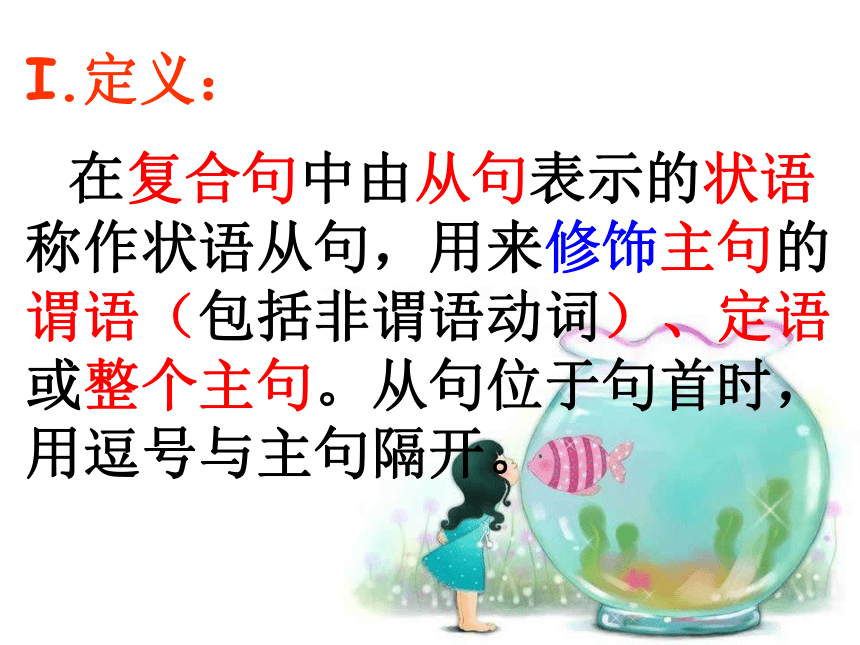
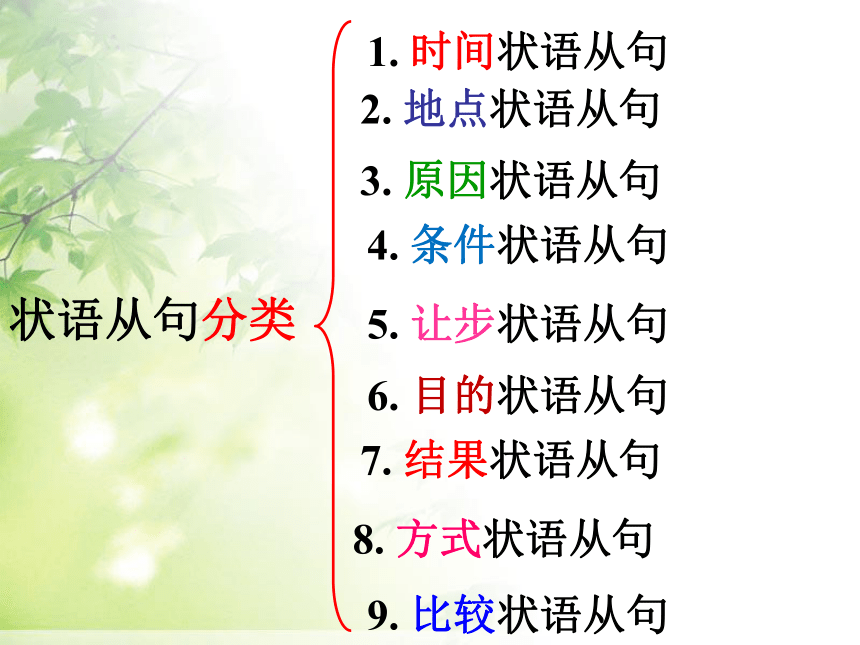

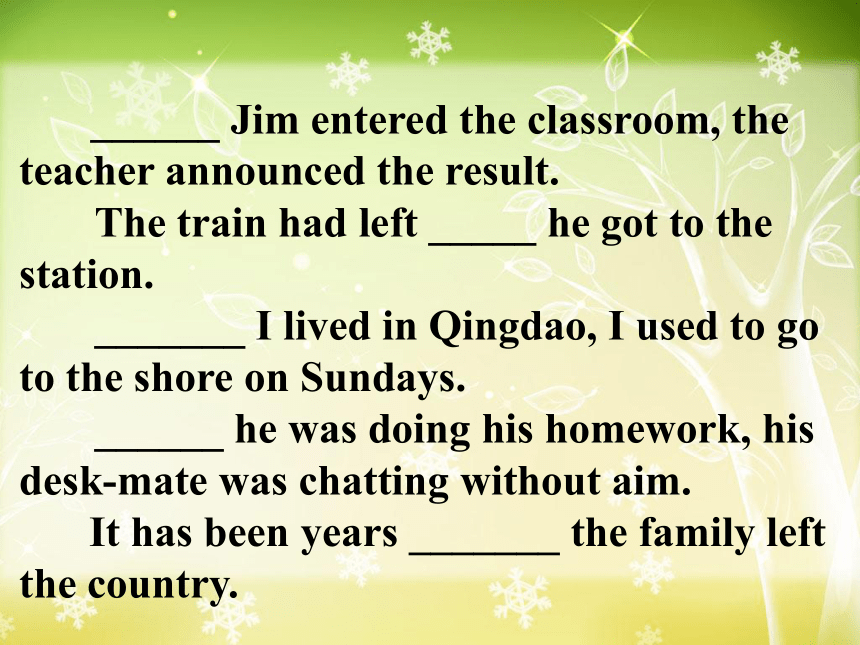

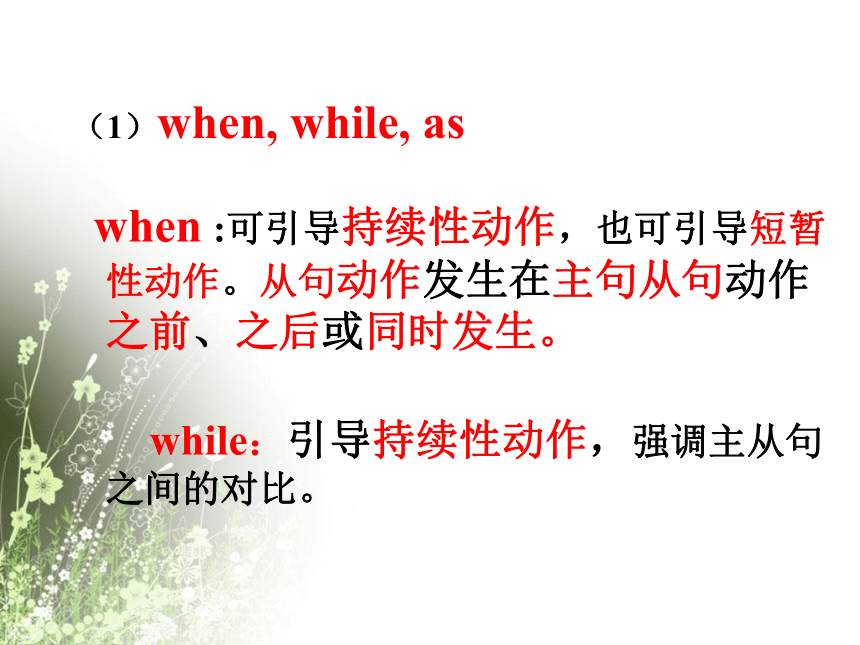
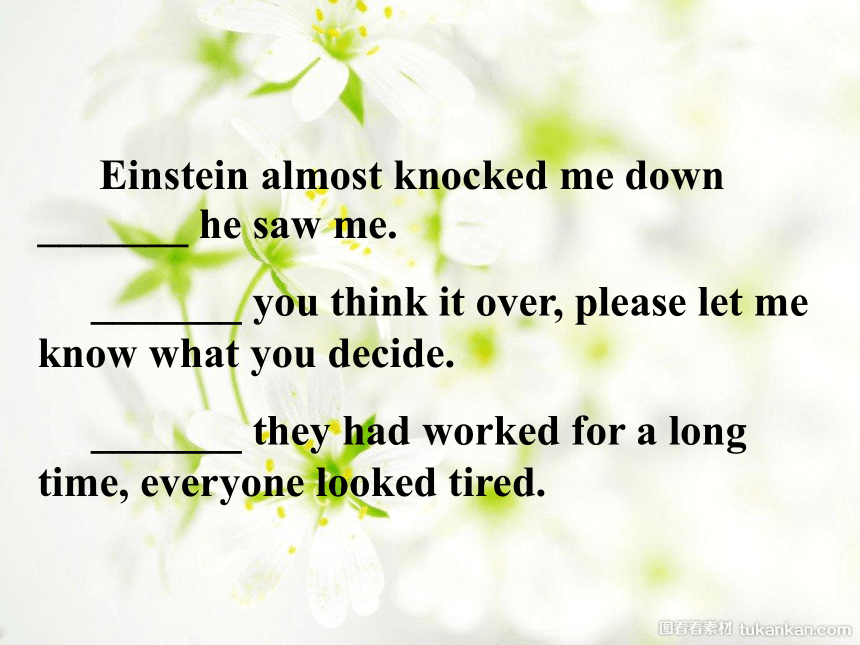
文档简介
课件25张PPT。 When Jim entered the classroom, the teacher announced the result.
While he was doing his homework, his desk-mates was chatting without aim.
You grow younger every time I see you.
He opened the windows for the air was dirty in the room. 时间和原因
状语从句
Adverbial Clauses Of Time and ReasonI.定义:
在复合句中由从句表示的状语称作状语从句,用来修饰主句的谓语(包括非谓语动词)、定语或整个主句。从句位于句首时,用逗号与主句隔开。状语从句分类1. 时间状语从句2. 地点状语从句3. 原因状语从句4. 条件状语从句5. 让步状语从句6. 目的状语从句7. 结果状语从句8. 方式状语从句9. 比较状语从句III.状语从句引导词 ______ Jim entered the classroom, the teacher announced the result.
The train had left _____ he got to the station.
_______ I lived in Qingdao, I used to go to the shore on Sundays.
______ he was doing his homework, his desk-mate was chatting without aim.
It has been years _______ the family left the country.1.Adverbial Clause of Time
when, as ,while, before, after, since, till
until, as soon as, hardly…..when
the moment, the minute, the first time….(1)when, while, as
when :可引导持续性动作,也可引导短暂性动作。从句动作发生在主句从句动作之前、之后或同时发生。
while:引导持续性动作,强调主从句之间的对比。 Einstein almost knocked me down _______ he saw me.
_______ you think it over, please let me know what you decide.
_______ they had worked for a long time, everyone looked tired.(2)before和after
before :表示主句动作发生在从句动作之后。当主句用将来时,从句总是用现在时;若before引导的从句谓语用的是过去时,则主句动词多用过去完成时,以便体现动作发生的先后。
after:表示主句动作发生在从句动作之后。主句和从句的动作的时间关系正好与before引导的从句相反。 it will be + 一段时间+ before…
(要过多久才会...)
it will not + 一段时间+ before…
(过不了多久之后就…)
It will be half a year ________ these new tax policies take effect.
It will be a long time ________ cancers can be cured.
It won’t be long ________ we meet again.
before 可以表示“还没来得及…就…”
Before they reached the station, the train had gone.
She stood up and left angrily before I could explain. It was not _______ he took off his sunglasses that I recognise him at the airport.
She won’t leave ________ he finishes his work.
She didn’t work ________ he came back. (3) till或until
till和until一般情况下可互换,但强调句型中用until。
Until 比till更正式,till不可用于句首。(4) Since:
引导的从句的谓语动词一般是非延续性动词, 主句的谓语动词是延续性或反复发生过的动作. Since 从句用一般过去时, 主句时态是现在完成时。
I __________(write) home several times since I came here.
She has been working in this factory since she_______(leave) school. It is/has been+ 时间段+ since 从句(did)… It is over ten years since I lived in the countryside.
It has been five years since he smoked.
It is ten months since they left his home.(5) 由as soon as, immediately, the moment, the instant, the minute, directly, instantly 等引导的时间状语从句表示“一……就”。
The moment/minute I heard the news, I hastened to the spot.
I will ring you up immediately I reach Canada. hardly (scarcely, rarely) …when / before, no sooner … than相当于as soon as。
主句用过去完成时,从句用一般过去时。当hardly, scarcely, rarely和no sooner位于句首时,主句用倒装语序。
He had hardly fallen asleep______ he felt a soft touch on his shoulder.
No sooner had the sun shown itself above the horizon _______he got out of bed to start work. (6) by the time:
若从句的谓语动词用一般过去时,主句的谓语动词用过去完成时;若从句的谓语动词用一般现在时,主句的谓语动词用将来完成时。
By the time you came back, I had finished this book.
By the time you come here tomorrow, I will have finished this work. (7) each time, every time, next time& whenever:
Each time he came to Harbin, he would call on me.
Next time I come across her, I will offer my congratulations.
Whenever that man says “To tell the truth”, I suspect that he’s about to tell a lie.
He didn't attend the meeting __________ he had much work to do.
_______ he can’t answer the question, you’d better ask someone else.becauseSince3. _______ I haven’t seen the film, I can’t tell you what I think of it.
4. The ground is wet, ______ it rained last night.
5. It rained last night, ______ the ground is wet.As forfor 原因状语从句由because, since, as, for, now that 等引导。
He opened the windows ______ it was hot.
She had to stay at home ______she was ill.
______ he has come, you needn’t go.
Now that my head had cleared, my brain was also beginning to work much better. 2. Adverbial Clause of Reason because: 语气最强,通常用于回答why 提出的问题。可位于主句前或后。 since:语气比because 弱,比as强,表示显然的、已知的原因,自然的结果,意为“既然,由于”, 位于主句前。 for:表示原因关系时,for分句是对第一分句内容的推断或猜测。位于主句之后。 as: 表示双方都知道的原因,语气弱。
now that: 与since相似,但now that 有新情况发生的含义,而since 没有。1. _____ you are leaving tomorrow, we can eat dinner together tonight.
A. For B. Since
C. Before D. WhileChoose the best answers.2. _____ it is so hot, let's go swimming.
A. For B. Now
C. Since D. Despite2. 既然这件事已经发生了,我只能解雇你。 Now that it has happened, I have to fire you. 1. 既然你已经尽力了,他们也不能怪你。 Now that you have tried you best to do it, they can not blame you either. Translation:
While he was doing his homework, his desk-mates was chatting without aim.
You grow younger every time I see you.
He opened the windows for the air was dirty in the room. 时间和原因
状语从句
Adverbial Clauses Of Time and ReasonI.定义:
在复合句中由从句表示的状语称作状语从句,用来修饰主句的谓语(包括非谓语动词)、定语或整个主句。从句位于句首时,用逗号与主句隔开。状语从句分类1. 时间状语从句2. 地点状语从句3. 原因状语从句4. 条件状语从句5. 让步状语从句6. 目的状语从句7. 结果状语从句8. 方式状语从句9. 比较状语从句III.状语从句引导词 ______ Jim entered the classroom, the teacher announced the result.
The train had left _____ he got to the station.
_______ I lived in Qingdao, I used to go to the shore on Sundays.
______ he was doing his homework, his desk-mate was chatting without aim.
It has been years _______ the family left the country.1.Adverbial Clause of Time
when, as ,while, before, after, since, till
until, as soon as, hardly…..when
the moment, the minute, the first time….(1)when, while, as
when :可引导持续性动作,也可引导短暂性动作。从句动作发生在主句从句动作之前、之后或同时发生。
while:引导持续性动作,强调主从句之间的对比。 Einstein almost knocked me down _______ he saw me.
_______ you think it over, please let me know what you decide.
_______ they had worked for a long time, everyone looked tired.(2)before和after
before :表示主句动作发生在从句动作之后。当主句用将来时,从句总是用现在时;若before引导的从句谓语用的是过去时,则主句动词多用过去完成时,以便体现动作发生的先后。
after:表示主句动作发生在从句动作之后。主句和从句的动作的时间关系正好与before引导的从句相反。 it will be + 一段时间+ before…
(要过多久才会...)
it will not + 一段时间+ before…
(过不了多久之后就…)
It will be half a year ________ these new tax policies take effect.
It will be a long time ________ cancers can be cured.
It won’t be long ________ we meet again.
before 可以表示“还没来得及…就…”
Before they reached the station, the train had gone.
She stood up and left angrily before I could explain. It was not _______ he took off his sunglasses that I recognise him at the airport.
She won’t leave ________ he finishes his work.
She didn’t work ________ he came back. (3) till或until
till和until一般情况下可互换,但强调句型中用until。
Until 比till更正式,till不可用于句首。(4) Since:
引导的从句的谓语动词一般是非延续性动词, 主句的谓语动词是延续性或反复发生过的动作. Since 从句用一般过去时, 主句时态是现在完成时。
I __________(write) home several times since I came here.
She has been working in this factory since she_______(leave) school. It is/has been+ 时间段+ since 从句(did)… It is over ten years since I lived in the countryside.
It has been five years since he smoked.
It is ten months since they left his home.(5) 由as soon as, immediately, the moment, the instant, the minute, directly, instantly 等引导的时间状语从句表示“一……就”。
The moment/minute I heard the news, I hastened to the spot.
I will ring you up immediately I reach Canada. hardly (scarcely, rarely) …when / before, no sooner … than相当于as soon as。
主句用过去完成时,从句用一般过去时。当hardly, scarcely, rarely和no sooner位于句首时,主句用倒装语序。
He had hardly fallen asleep______ he felt a soft touch on his shoulder.
No sooner had the sun shown itself above the horizon _______he got out of bed to start work. (6) by the time:
若从句的谓语动词用一般过去时,主句的谓语动词用过去完成时;若从句的谓语动词用一般现在时,主句的谓语动词用将来完成时。
By the time you came back, I had finished this book.
By the time you come here tomorrow, I will have finished this work. (7) each time, every time, next time& whenever:
Each time he came to Harbin, he would call on me.
Next time I come across her, I will offer my congratulations.
Whenever that man says “To tell the truth”, I suspect that he’s about to tell a lie.
He didn't attend the meeting __________ he had much work to do.
_______ he can’t answer the question, you’d better ask someone else.becauseSince3. _______ I haven’t seen the film, I can’t tell you what I think of it.
4. The ground is wet, ______ it rained last night.
5. It rained last night, ______ the ground is wet.As forfor 原因状语从句由because, since, as, for, now that 等引导。
He opened the windows ______ it was hot.
She had to stay at home ______she was ill.
______ he has come, you needn’t go.
Now that my head had cleared, my brain was also beginning to work much better. 2. Adverbial Clause of Reason because: 语气最强,通常用于回答why 提出的问题。可位于主句前或后。 since:语气比because 弱,比as强,表示显然的、已知的原因,自然的结果,意为“既然,由于”, 位于主句前。 for:表示原因关系时,for分句是对第一分句内容的推断或猜测。位于主句之后。 as: 表示双方都知道的原因,语气弱。
now that: 与since相似,但now that 有新情况发生的含义,而since 没有。1. _____ you are leaving tomorrow, we can eat dinner together tonight.
A. For B. Since
C. Before D. WhileChoose the best answers.2. _____ it is so hot, let's go swimming.
A. For B. Now
C. Since D. Despite2. 既然这件事已经发生了,我只能解雇你。 Now that it has happened, I have to fire you. 1. 既然你已经尽力了,他们也不能怪你。 Now that you have tried you best to do it, they can not blame you either. Translation:
